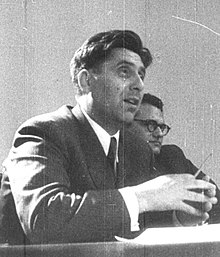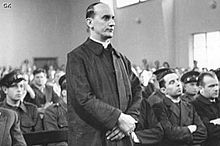Jakov Blažević
Jakov Blažević (born March 24, 1912 in Bužim , Gospić ; † December 10, 1996 ) was a Yugoslav lawyer and politician of the Socialist Republic of Croatia , who served as President of the Executive Council between 1953 and 1962, first Prime Minister and later from 1967 to 1974 as President of the Assembly or from 1974 to 1982 as chairman of the presidium was President of the Socialist Republic of Croatia, a republic within the Socialist Federal Republic of Yugoslavia .
Life
Studies, Communist Party functionary and World War II
Blažević joined the Communist Party of Yugoslavia (CPJ) as a member in 1932 at the age of 16 and began studying law at the University of Zagreb after attending school , which he graduated in 1936. He then took up an activity as a lawyer and in 1940 became secretary of the Communist Party district leadership of Lika . He was dismissed from this office in 1941 on the instructions of the General Secretary of the Communist Party of Croatia, Rade Končar , but took over the role of secretary of the Communist Party district leadership of Lika again after Končar's execution on May 22, 1942.
In 1943 he moved to head of the legal and organizational department of the anti-fascist regional council of the people's liberation of Croatia ZAVNOH (Zemaljsko antifašističko vijeće narodnog oslobođenja Hrvatske) , the newly established supreme body of the anti-fascist movement in Croatia during the Second World War . At the same time he was elected a member of the Executive Committee of the ZAVNOH and also a member of the Central Committee (ZK) of the CPJ. In 1944 he was appointed the first President of the ZAVNOH Supreme Court.
Prosecutor General of the Socialist Republic of Croatia and the trial of Alojzije Stepinac
After the end of the war, Blažević first became the General Prosecutor of the Socialist Republic of Croatia and, in this capacity, represented the prosecution against the Archbishop of Zagreb , Alojzije Stepinac , in 1946 . In 1946, Stepinac was sentenced to 16 years in prison with forced labor in a political show trial. The defense was severely hindered by the court, so only 7 of the 47 witnesses summoned were admitted. The accusation was in summary of the cooperation with the Ustaše regime, the forced conversion of the Orthodox Christians and resistance to the new power. Before the process, which was heavily criticized, especially by the Vatican , the Yugoslav government offered the Apostolic Nuncio to transfer Stepinac, but received no response. Pope Pius XII described the proceedings against Stepinac as "the saddest trial ( tristissimo processo ) in church history". In addition to the Vatican, western statesmen and clergy protested against the imprisonment. Stepinac was released after 6 years of imprisonment in his home community Krašić, where he was placed under house arrest in his parents' house with constant surveillance by the police. The arrest lasted until his death.
Prime Minister and President of the Socialist Republic of Croatia
On December 18, 1953, Blažević succeeded Vladimir Bakarić as chairman of the executive council and thus Prime Minister of the Socialist Republic of Croatia. He held this position for almost nine years until July 1962 and was then replaced by Zvonko Brkić .
In 1967 he succeeded Ivan Krajačić as President of the Parliament of Croatia ( Sabor ) and thus de facto President of this republic. At the same time he was a member of the Presidium of the Union of Communists of Yugoslavia, BdKJ, between 1969 and 1972 and was thus a member of the highest governing body of the Communist Party of Yugoslavia. In addition, from 1971 to 1974 he was a member of the Presidium of the Socialist Federal Republic of Yugoslavia, the collective State Presidium of Yugoslavia.
After the reorganization of the state system through the 1974 constitution, Blažević became the first chairman of the presidium on May 8, 1974, and thus remained President of the Socialist Republic of Croatia in this capacity. He remained in this office until 1982 and was then replaced by Marijan Cvetković . He himself withdrew from political life.
For his services during the liberation of Croatia in World War II, he was awarded the Order for National Heroes (Orden narodnog heroja) . Later, however, his attitude in particular during the trial of Alojzije Stepinac was heavily criticized.
Publications
- O novom ustavu socijalističke samoupravne demokracije: Gegenwartnosti revolucije , Zagreb 1973
- Tražio sam crvenu nit , Zagreb 1976
- Mač, a ne mir: Za pravnu sigurnost građana , Zagreb 1980
- Bez alternative , Zagreb 1980
- Historijsko pamćenje , Zagreb 1982
- Povijest i falsifikati , Zagreb 1983
- Brazdama partije , co-author Vera Gerovac-Blažević, Zagreb 1986
Web links
- Godinama u Vili Blažević ljetovao komunistički moćnik, a danas radi nemara države propada . In: Novi list of July 28, 2013
- Entry in rulers.org
- State and Prime Minister of Croatia (rulers.org)
Individual evidence
- ↑ Stepinac's biography in the Lexicon of Saints
| personal data | |
|---|---|
| SURNAME | Blažević, Jakov |
| BRIEF DESCRIPTION | Yugoslav politician and lawyer |
| DATE OF BIRTH | March 24, 1912 |
| PLACE OF BIRTH | Bužim , Gospić |
| DATE OF DEATH | December 10, 1996 |

